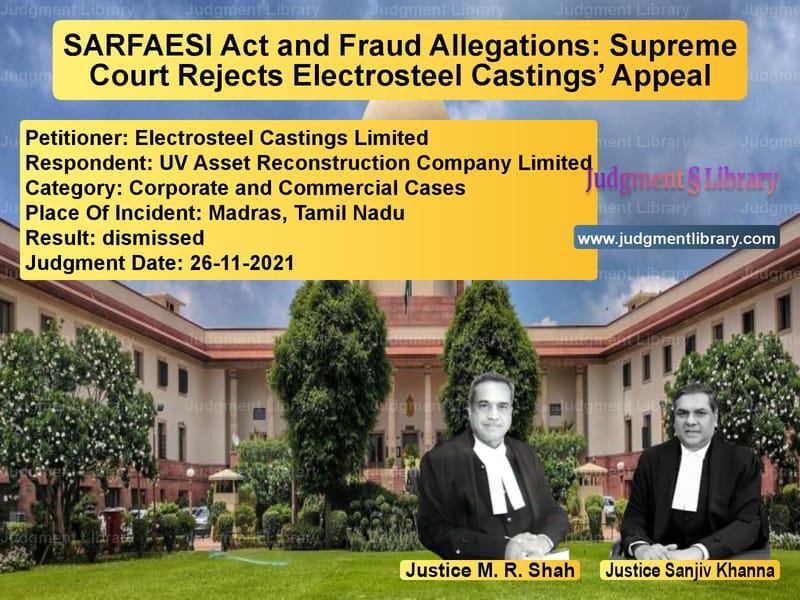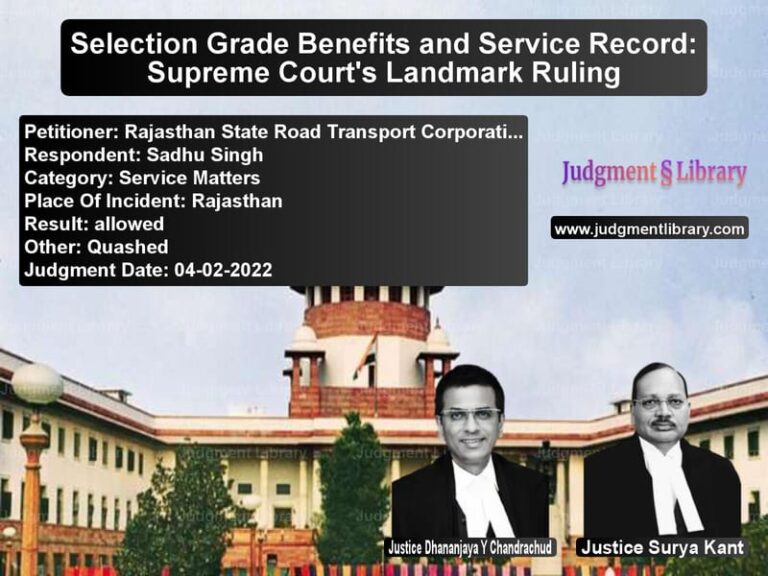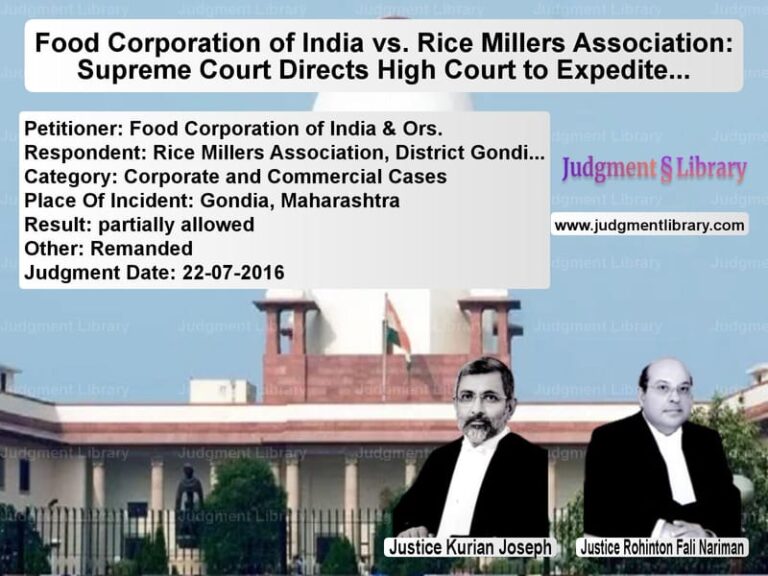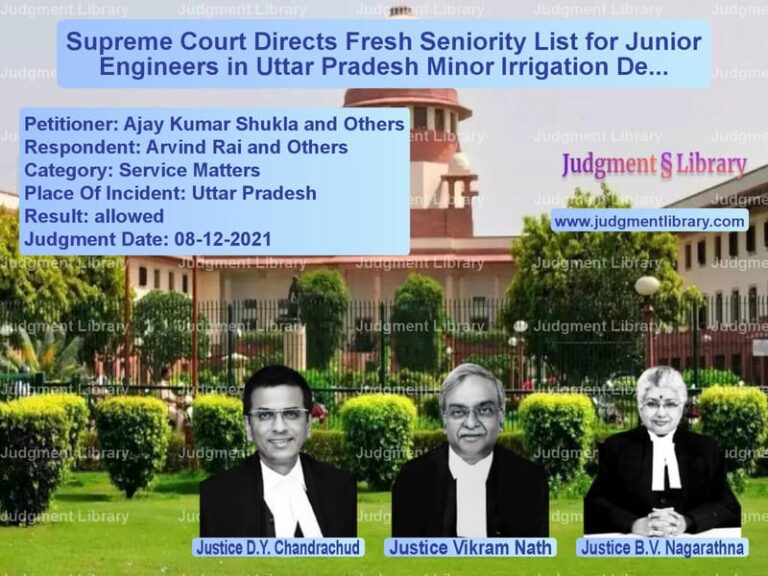SARFAESI Act and Fraud Allegations: Supreme Court Rejects Electrosteel Castings’ Appeal
The case of Electrosteel Castings Limited v. UV Asset Reconstruction Company Limited & Ors. raises crucial questions regarding the jurisdiction of civil courts under the SARFAESI Act, 2002, and whether allegations of fraud can circumvent the legal bar against such suits. The Supreme Court ultimately ruled against the appellant, emphasizing that clever drafting cannot override statutory provisions.
The appeal arose after the Madras High Court dismissed Electrosteel Castings Limited’s (ECL) suit on the grounds that it was barred under Section 34 of the SARFAESI Act. ECL argued that the assignment agreement through which UV Asset Reconstruction Company acquired rights against it was fraudulent. However, the Supreme Court found no material particulars supporting the fraud claim, leading to the dismissal of the appeal.
Background of the Case
The dispute stemmed from a loan of Rs. 500 crores taken by the corporate debtor, which Electrosteel Castings Limited had guaranteed by mortgaging its land and machinery. The corporate debtor defaulted, leading to insolvency proceedings under the Insolvency and Bankruptcy Code (IBC), 2016. A resolution plan was approved, settling the outstanding debt through cash payments and share transfers.
Despite this, UV Asset Reconstruction Company, having acquired the loan rights through an assignment agreement, demanded payment from ECL under SARFAESI provisions. ECL challenged the legality of this assignment, contending that the resolution process under IBC had extinguished any remaining debt.
Petitioner’s Arguments
Electrosteel Castings Limited, represented by Dr. A.M. Singhvi, argued:
- The assignment agreement was fraudulent as it transferred a debt that had already been discharged through the IBC resolution plan.
- The High Court failed to appreciate that claims involving fraud fall outside the jurisdictional bar of Section 34 of the SARFAESI Act.
- Since the corporate debtor was discharged, no dues remained payable by the appellant as a guarantor.
- As an alternative remedy, ECL requested that if the Supreme Court did not entertain the appeal, it should be permitted to approach the Debt Recovery Tribunal (DRT) under SARFAESI.
Respondent’s Arguments
UV Asset Reconstruction Company, represented by Shri Shyam Divan and Shri Huzefa Ahmadi, countered:
- The suit was correctly dismissed under Section 34 of the SARFAESI Act, which bars civil courts from interfering in matters that fall under DRT’s jurisdiction.
- ECL’s fraud allegations lacked substance, consisting merely of the word ‘fraudulent’ without factual particulars.
- The suit was an attempt to abuse legal processes and circumvent SARFAESI’s statutory provisions.
- ECL itself had filed an application before the DRT regarding the possession notice but had omitted fraud claims there.
Supreme Court’s Judgment
The Supreme Court upheld the dismissal of ECL’s suit, ruling:
“The allegations of ‘fraud’ are made without any particulars and only with a view to get out of the bar under Section 34 of the SARFAESI Act.”
The Court reiterated that merely labeling an act as fraudulent does not constitute a valid pleading of fraud, citing precedents such as Bishundeo Narain v. Seogeni Rai and T. Arivandandam v. T.V. Satyapal. It emphasized that a suit barred by statute cannot be revived through clever wording.
However, the Court allowed ECL the opportunity to pursue remedies before the DRT under SARFAESI within two weeks.
Conclusion
The ruling underscores that procedural compliance and factual substantiation are critical when alleging fraud in legal proceedings. While statutory bars on jurisdiction are strictly upheld, alternative remedies within the prescribed framework remain available. The judgment serves as a strong precedent against misuse of civil litigation to delay financial recovery actions.
Petitioner Name: Electrosteel Castings Limited.Respondent Name: UV Asset Reconstruction Company Limited.Judgment By: Justice M. R. Shah, Justice Sanjiv Khanna.Place Of Incident: Madras, Tamil Nadu.Judgment Date: 26-11-2021.
Don’t miss out on the full details! Download the complete judgment in PDF format below and gain valuable insights instantly!
Download Judgment: electrosteel-casting-vs-uv-asset-reconstruct-supreme-court-of-india-judgment-dated-26-11-2021.pdf
Directly Download Judgment: Directly download this Judgment
See all petitions in Bankruptcy and Insolvency
See all petitions in Corporate Compliance
See all petitions in unfair trade practices
See all petitions in Judgment by Mukeshkumar Rasikbhai Shah
See all petitions in Judgment by Sanjiv Khanna
See all petitions in dismissed
See all petitions in supreme court of India judgments November 2021
See all petitions in 2021 judgments
See all posts in Corporate and Commercial Cases Category
See all allowed petitions in Corporate and Commercial Cases Category
See all Dismissed petitions in Corporate and Commercial Cases Category
See all partially allowed petitions in Corporate and Commercial Cases Category







